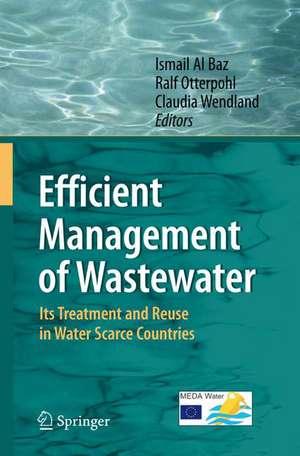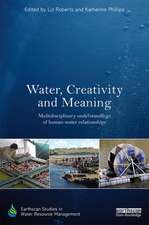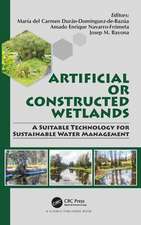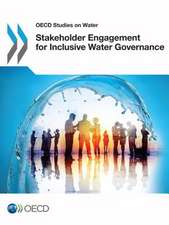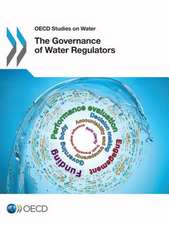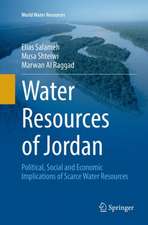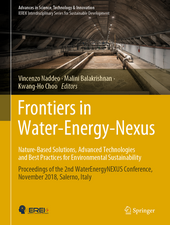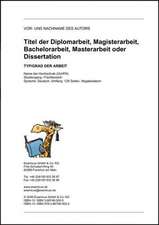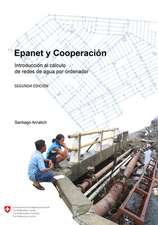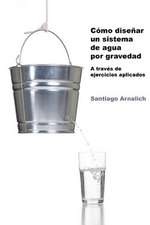Efficient Management of Wastewater: Its Treatment and Reuse in Water-Scarce Countries
Editat de Ismail Al Baz, Ralf Otterpohl, Claudia Wendlanden Limba Engleză Hardback – 17 dec 2007
Toate formatele și edițiile
| Toate formatele și edițiile | Preț | Express |
|---|---|---|
| Paperback (1) | 945.79 lei 6-8 săpt. | |
| Springer Berlin, Heidelberg – 14 noi 2014 | 945.79 lei 6-8 săpt. | |
| Hardback (1) | 799.26 lei 38-44 zile | |
| Springer Berlin, Heidelberg – 17 dec 2007 | 799.26 lei 38-44 zile |
Preț: 799.26 lei
Preț vechi: 1051.66 lei
-24% Nou
Puncte Express: 1199
Preț estimativ în valută:
152.93€ • 159.30$ • 127.49£
152.93€ • 159.30$ • 127.49£
Carte tipărită la comandă
Livrare economică 25-31 martie
Preluare comenzi: 021 569.72.76
Specificații
ISBN-13: 9783540744917
ISBN-10: 3540744916
Pagini: 324
Ilustrații: XIX, 303 p.
Dimensiuni: 155 x 235 x 25 mm
Greutate: 0.67 kg
Ediția:2008
Editura: Springer Berlin, Heidelberg
Colecția Springer
Locul publicării:Berlin, Heidelberg, Germany
ISBN-10: 3540744916
Pagini: 324
Ilustrații: XIX, 303 p.
Dimensiuni: 155 x 235 x 25 mm
Greutate: 0.67 kg
Ediția:2008
Editura: Springer Berlin, Heidelberg
Colecția Springer
Locul publicării:Berlin, Heidelberg, Germany
Public țintă
ResearchCuprins
The 2006 WHO Guidelines for Wastewater and Greywater Use in Agriculture: A Practical Interpretation.- EMWater Guide and Recommendations on Wastewater Treatment and Water Reuse.- Integrated Wastewater Management: A Review.- Egyptian Effluent Standards for Treated Sewage: Evaluation and Recommendations.- Groundwater Contamination as Affected by Long-Term Sewage Irrigation in Egypt.- Effluent and Sludge Management in Yemen.- Fate of Pathogens In Tomato Plants and Soil Irrigated With Secondary Treated Wastewater.- Alleviation of Salinity Stress Imposed on Broad Bean (Vicia faba) Plants Irrigated With Reclaimed Wastewater Mixed With Brackish Water Through Exogenous Application of Jasmonic Acid.- Response of Durum Wheat (Triticum durum Desf) Cultivar Acsad 1107 to Sewage Sludge Amendment Under a Semi-Arid Climate.- Waste Stabilization Ponds: A Highly Appropriate Wastewater Treatment Technology for Mediterranean Countries.- Sustainable Sanitation by Constructed Wetlands in the Mediterranean Countries: Experiences in Small/Medium-Size Communities and Tourism Facilities.- Effect of Depth on the Performance of Algae-Based Wastewater Treatment Ponds.- Adapting High-rate Anaerobic Treatment to Middle East Conditions.- Options for Improving the Effectiveness and Potentials for a Sustainable Resource Recovery in Constructed Wetlands.- Integrated Anaerobic–Aerobic Treatment of Concentrated Sewage.- Aerobic and Anaerobic Biotreatment of Olive Oil Mill Wastewater in Lebanon.- Cost-Efficiency in Water Management Through Demand Side Management and Integrated Planning.- The LooLoop-Process: The First “Waterless” Flushing Toilet.- Contribution of Sewage Sludge to the Fertility of the Soil and the Growth of Barley (Hordium Vulgare L) Variety Jaidor.- The Use of a Pilot-Scale MembraneBioreactor in Treating Domestic Wastewater with Variable Characteristics for Potential Water Reuse on a University Campus.- Socioeconomic Aspects of Wastewater Treatment and Water Reuse.- Cost–Benefit Analysis for Centralized and Decentralized Wastewater Treatment System (Case Study in Surabaya-Indonesia).- Sustainable Community Water Project Implementation in Jordan.- Waste Water Reuse for Agriculture Pilot Project at the Jordan University of Science and Technology.
Textul de pe ultima copertă
Water reuse management is one of the challenges all water scarce countries have to deal with in the coming decades. Many Mediterranean countries are currently facing serious problems regarding the supply of sufficient water resources to cover their increasing water supply demands. In the year 2025, countries like Jordan, Israel and Palestine will have less than 150 cubic meters per capita and year. Other countries like Syria and Lebanon, at present classified as "water rich", will also face similar water stress problems during the next two decades. Therefore, these countries need water strategies that have to take into account alternative measures to cope with this situation. Water reuse is one of the essential options to be considered for the development of national water policies and strategies.
The present book highlights non-conventional solutions within the field of wastewater treatment and reuse predominantly for professionals and decision makers. It focuses on technologies like anaerobic and extensive treatment of municipal, domestic wastewater and grey water which are reliable, sustainable, low cost and suitable for rural and sub urban areas. Additionally, particular innovative on site concepts are presented. Within water reuse as overall objective, guidelines and recommendations as well as social aspects of water reuse are presented and discussed.
The present book highlights non-conventional solutions within the field of wastewater treatment and reuse predominantly for professionals and decision makers. It focuses on technologies like anaerobic and extensive treatment of municipal, domestic wastewater and grey water which are reliable, sustainable, low cost and suitable for rural and sub urban areas. Additionally, particular innovative on site concepts are presented. Within water reuse as overall objective, guidelines and recommendations as well as social aspects of water reuse are presented and discussed.
